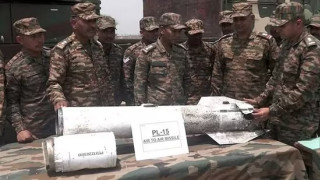
Sheikh Hasina's explosive accusations against Yunus: Ex- Bangladesh PM said THIS in her first public address (Photo Credits: ANI)
World News: In her first public address since fleeing Bangladesh in August, former Prime Minister Sheikh Hasina has made explosive allegations against interim government leader Muhammad Yunus, accusing him of orchestrating 'genocide' against minority communities. Speaking from New York during a virtual event commemorating Bijoy Dibos, or Victory Day, Hasina's remarks have ignited a firestorm of controversy and drawn international attention to the deteriorating situation in Bangladesh.
Hasina, who sought refuge in India following her ouster amid widespread protests, described Yunus as the 'main perpetrator of genocide' and accused him of being 'power-hungry.' She asserted that under his leadership, there have been systematic attacks on Hindus, Buddhists, and Christians. Hasina stated, 'Today, I am being accused of genocide. In reality, Yunus has been involved in genocide in a meticulously designed manner. The masterminds – the student coordinators and Yunus – are behind this genocide'.
Hasina painted a bleak picture of the current state of minority rights in Bangladesh, claiming that police and members of minority communities have been killed during protests. She highlighted the destruction of places of worship, stating, “Hindus, Buddhists, Christians – no one has been spared. Eleven churches have been razed, temples and Buddhist shrines have been broken' . This alarming rhetoric underscores the rising tensions between different religious communities in Bangladesh.
In her address, Hasina also expressed fears for her safety and that of her sister Sheikh Rehana, alleging there were plans to assassinate them similar to the fate that befell their father, Sheikh Mujibur Rahman, who was killed by army officers in 1975. 'The armed protestors were directed towards Ganabhaban. If the security guards opened fire, many lives would have been lost,' she recounted, reflecting on the chaotic events leading to her departure from Dhaka on August .
The fallout from Hasina's allegations has been swift. Yunus’s spokesperson responded vehemently, labeling Hasina a 'mass murderer' and asserting that she oversaw one of the most brutal dictatorships in Bangladesh's history. He stated that under her rule, thousands were killed or disappeared while millions faced false charges 45. This exchange marks a significant escalation in the ongoing feud between these two prominent political figures.
Moreover, relations between India and Bangladesh have soured recently due to concerns over the treatment of minorities in Bangladesh and the arrest of Hindu monk Chinmoy Krishna Das on sedition charges. The interim government has expressed intentions to seek Hasina's extradition from India, further complicating diplomatic relations between the two neighboring countries .
As Sheikh Hasina continues to speak out against what she describes as atrocities committed under Yunus’s interim government, the situation in Bangladesh remains precarious. Her claims not only highlight significant human rights concerns but also reflect deep political divisions within the country. The international community watches closely as these developments unfold, with potential implications for regional stability and minority rights in Bangladesh.













Copyright © 2025 Top Indian News
